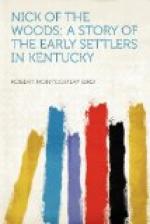Thus satisfying Roland he had good reasons for choosing his own path, Nathan led the way to the verge of the river; where, leaving the broad buffalo-trace by which he descended the banks, and diving through canes and rocks, until he had left the ford to which the path led, a quarter-mile or more behind, he stopped at last under a grim cliff overgrown with trees and brambles, where a cove or hollow in the rock, of a peculiarly wild, solitary, and defensible character, invited him to take up quarters for the night.
Nor did this seem the first time Wandering Nathan had sought shelter in the place, which possessed an additional advantage in a little spring that trickled from the rock, and collected its limpid stores in a rocky basin hard by; there were divers half-burned brands lying on its sandy floor, and a bed of fern and cane-leaves, not yet dispersed by the winds, that had evidently been once pressed by a human form.
“Thee will never see a true man of the woods,” said Nathan, with much apparent self-approval, “build his camp-fire on a roadside, like that unlucky foolish man, Ralph Stackpole by name, that ferried thee down the river. Truly, it was a marvel he did not drown thee all, as well as the poor man Dodge! Here, friend, we can sleep in peace; and, truly, sleep will be good for thee, and me, and little Peter.”
With these words, Nathan set about collecting dried logs and branches, which former floods had strown in great abundance along the rocks; and dragging them into the cove, he soon set them in a cheerful blaze. He then drew forth his stores of provender—the corn and dried meat he had taken from the Piankeshaws’ pouches,—the latter of which, after a preliminary sop or two in the spring, for the double purpose of washing off the grains of gunpowder, tobacco, and what not, the usual scrapings of an Indian’s pocket,—and of restoring its long vanished juices,—he spitted on twigs of cane, and roasted with exceeding patience and solicitude at the fire. To these dainty viands he added certain cakes and lumps of some nondescript substance, as Roland supposed it, until assured by Nathan it was good maple-sugar, and of his own making. “Truly,” said he, “it might have been better, had it been better made. But, truly, friend, I am, as thee may see, a man that lives in the woods, having neither cabin nor wigwam, the Injuns having burned down the same, so that it is tedious to rebuild them; and having neither pots nor pans, the same having been all stolen, I did make my sugar in the wooden troughs, boiling it down with hot stones; and, truly, friend, it doth serve the purpose of salt, and is good against hunger in long journeys.”
There was little in the dishes, set off by Nathan’s cookery, or in his own feelings, to dispose the sick and weary soldier to eat; and having swallowed but a few mouthfuls, he threw himself upon the bed of leaves, hoping to find that refreshment in slumber which neither food nor the conversation of his companion could supply. His body being as much worn and exhausted as his mind, the latter was not doomed to be long tossed by grief and fear; and before the last hues of sunset had faded in the west, slumber had swept from his bosom the consciousness of his own sufferings, with even the memory of his Edith.




